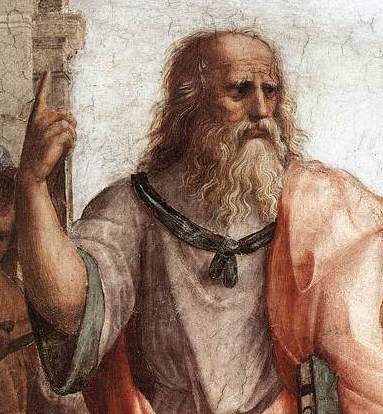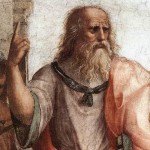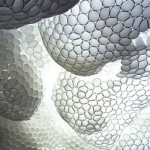THERE ARE NO NEW IDEAS. PART 2
Part 2 of a 3-Part Series. Click here for Part 1.
Plato believed that any idea was attainable by an individual, but only because he thought knowledge is innate. In The Republic, Plato implied that there are not New Ideas, because all knowledge exists within us - within our souls. We merely just need to ‘recall’ an idea through a process he called anamnesis in order to discover or learn. Also, every ‘thing,’ already exists in its purest sense as a “form” whether or not humanity has discovered or ‘invented’ said thing1. Plato also said, in his metaphorical model for his epistemological beliefs, that the source of illumination (his process of learning and understanding) is the sun. It is no coincidence that so many artists work visually and, through their art, attempt to give us New ways to think about the world while scientists endeavor to discover New ways to observe the world. Plato suggests, with his complicated and whimsical metaphor, that the sun, which some philosophers interpret as God, enables us to gain knowledge.
The Boston artist Nick Rodrigues provides empirical evidence for platonic philosophy concerning the New. “I consider certain works of design or art to be discoveries instead of creations - more like a discovery in math or science,” he said, “I feel like it is just a matter of time before someone does it.”2 For a sculpture, Rodrigues was keeping all of his old coffee cups and attaching them to each other to create beehive-like forms. Then Rodrigues happened upon the sculptor Tara Donovan, a MacArthur Fellowship recipient - the so-called “Genius” grant - who recently had a solo show at Boston’s Institute of Contemporary Art. Coincidentally, Donovan’s work “transforms everyday, disposable materials into formally elegant sculptures [and]installations,” according to the ICA, and the show included Donovan’s piece “Untitled (Styrofoam Cups):” a cloud like sculpture comprised of Styrofoam cups (pictured). Needless to say, this complicated Rodrigues’ attempts to create a naturally or organically-inspired art object with coffee cups. “The way I look at it,” he said, “…the material properties of a cup lend themselves to fitting together in that way.” Rodrigues will finish his piece, despite Donovan’s apparent primacy. He asks, “Is it wrong for me to continue with my cup piece now that the MacArthur genius Tara Donavan has beaten me to it? I think it is okay because I'm just using a new technique of ‘cup jointery’ and my concept is completely different, but you better believe I'm gonna hear some shit about it…”3
In his Origins of Genius: Darwinian Perspectives on Creativity4, Dean Keith Simonton says creativity consists of two separate components. “First,” he explains, “a creative idea… must be original.” (5) “Second, the original idea… must prove adaptive in some sense.” His first “criterion,” as he refers to each tenet in the book, is patently obvious, but he added the second because ideas need to be able to endure.5 Simonton wrote his book about how genius figures into evolution, so he needs to make this point clear. Unadaptive ideas don’t contribute to the evolution of knowledge and are therefore forgotten. They typically expire quickly, and if they don’t, they usually take their creators with them when they move on from our collective consciousness (consider the one-hit-wonder)6.
The ideas of artists, unlike scientists, entrepreneurs or philosophers, don’t necessarily need to be applicable to empirical science, a sellable product, or rely on sensicality. There are some limitations however, as Simonton writes: “In the arts… adaptiveness often entails the capacity to maintain interest through novel expression as well as through powerful emotional appeal.” (5-6) A problem with unadaptive ideas, however, is that they may resurface (again, consider the one-hit-wonder) and artists should take heed if attempting to be successful7 - one shan’t create for the sake of being a creator. Nonetheless, the artist may be on track for success if they unknowingly produce an idea from a successful work from the past - a work that has proven itself adaptive over time. If anything, the unconscious and accidental replication, but not duplication, of a masterpiece or its basic ideas demonstrates the artist’s creative and intellectual potency.
Before I guide, lure or drag you any further down this path, let’s consider this idea of genius. To begin with, the MacArthur Foundation and Simonton both require some conception of genius in order for us to appreciate their opinions. Rodrigues was just edged out by an individual who the MacArthur Foundation considers a genius, and Simonton considers genius a property of certain people. He quotes Francis Galton from his “1869 classic” Hereditary Genius to help him reach a definition of genius based on eminence: “the opinion of contemporaries, revised by posterity . . . the reputation of a leader of opinion, of an originator, of a man to whom the world deliberately acknowledges itself largely indebted.” (4) The MacArthur Foundation bases its selection of “Genius” grantees on the following three criteria: “exceptional creativity, promise for important future advances based on a track record of significant accomplishment, and potential for the fellowship to facilitate subsequent creative work.” Among the definitions Merriam-Webster8 provides for genius are, “extraordinary intellectual power especially as manifested in creative activity” and “a person endowed with transcendent mental superiority.” Wikipedia’s definition9 of genius stands as the most apt for this essay both for the definition itself and the fact that more people, by several orders of magnitude, have been able to weigh in on its correctness: “a person who successfully applies a previously unknown technique in the production of a work of art, science or calculation…”10
If the creation of the “previously unknown” is a capability that only a genius possesses, as the Wikipedia entry implies, then “genius” insinuates that an individual with the gift possesses an intellect that is beyond comprehension - it is not of this world. It is supernatural. The fruit of a genius intellect stands as equal to or, simply put, is divine. Indeed, many would consider it a sin to take credit for an act of genius.
On the other hand, if you consider yourself and your thoughts part of a material world, as all secular humanists and even some religious folk do, all ideas are causally determined - i.e. they are predetermined from every event, no matter how large or small, that occurs before any idea. Everything that ever happens is merely part of an infinite blueprint for every idea. If we look into the past, we can see the evolution of ideas; and if we could see into the future, we would be able to witness their progression into eternity. The infusion of anything beyond that chain of events could only be divine intervention. In order to transcend the chain of determinism, one would need to be truly gifted - i.e. endowed with “God-given” power. Belief in New Ideas requires a belief in God or some other supernatural entity like ‘Him.’ This is why the phrase “New Ideas” is capitalized throughout this piece. If they were to exist, New Ideas would be holy.
Look for Part 3 in Issue 99.
[1] Grateful regards to Micah Malone for inciting this section and providing many of the insights needed for to it to work.
[2] The artist Pixnit pointed out that “there are the moments in history when three separate societies on vastly separate continents come up with the same idea around the same time, such as the pre-historic hand stencils found in South American, European and North American caves.” This could be evidence of universal consciousness, as Pixnit suggests, but may also lend support to Plato and Rodrigues’ theory.
[3] Federal courts have even weighed in on issues related to Rodrigues’ dilemma. Judge Learned Hand eloquently noted in a 1935 decision on patents that “…the elements are capable of an infinity of permutations, and the selection of that group which proves serviceable to a given need may require a high degree of originality. It is that act of selection which is the 'invention' and it must be beyond the capacity of common-place imagination.” (B.G. Corp. v. Walter Kidde & Co., 79 F.2d 20, 21-22, 26 USPQ 288 (2d Cir. 1935)). The implication in Judge Hand’s statement is that all combinations of elements exist. It is the “selection” (anamnesis perhaps?) of a specific permutation (that already exists!), which is the act we are capable of.
[4] Simonton, Dean Keith. Origins of Genius: Darwinian Perspectives on Creativity Oxford University Press US, 1999. Accessed on Google Books.
[5] The artist Linda Price-Sneddon noted in the comment section of first installment of this essay that “consciousness is by its nature derivative” and brought up an idea from William James: “A genuine first-hand religious experience...is bound to be a heterodoxy to its witnesses, the prophet appearing as a mere lonely madman. If his doctrine prove contagious enough to spread to any others, it becomes a definite and labeled heresy. But if it then still prove contagious enough to triumph over persecution, it becomes itself an orthodoxy; its day of inwardness is over; the spring is dry; the faithful live at second hand exclusively and stone the prophets in their turn. The new church, in spite of whatever human goodness it may foster, can be henceforth counted on as a staunch ally in every attempt to stifle the spontaneous spirit, and to stop all later bubblings of the fountain from which, in purer days, it drew its own supply of inspiration.” (The Varieties of Religious Experience, 1905) James’ logic parallels Simonton’s on adaptive ideas, but he reminds us of the dangers of ideas that, through their eminence, crush the evolution of ideas.
[6] For the sake of my argument’s strength, I’m allowing all ideas, no matter how ridiculous, to be considered - ANY idea’s ostensible creator may claim his or her idea to be New to test my thesis. Be reminded, however, that you’re wasting your time - not only because you’re wrong, but because your idea will soon be forgotten.
[7] The word ‘success’ is intended to be interpreted broadly here. It does not solely imply commercial success. Don’t be so cynical.
[8] Just throwing this in for obviousness’ sake.
[9] For more on genius definitions, see Michael J.A. Howe’s Genius Explained (who spends a great deal of this book just trying to reach a definition for genius), Lewis Madison Terman’s Genetic Studies of Genius (N.B., Terman was a eugenicist), and Malcom Gladwell’s Outliers: The Story of Success.
[10] Acquired from Wikipedia on 19 January, 2008 at http://en.wikipedia.org/wiki/Genius.
Part 1 available here.
- Platon as represented by Raphael in The School of Athens (detail), Fresco, 1509–1510.
- Tara Donovan, Untitled (Styrofoam Cups) (detail), Styrofoam Cups, 2003. Photo credit: Ace Gallery, Los Angeles, Courtesy PaceWildenstein, New York.
- Charles Darwin portrait taken in 1868 by Julia Margaret Cameron.






